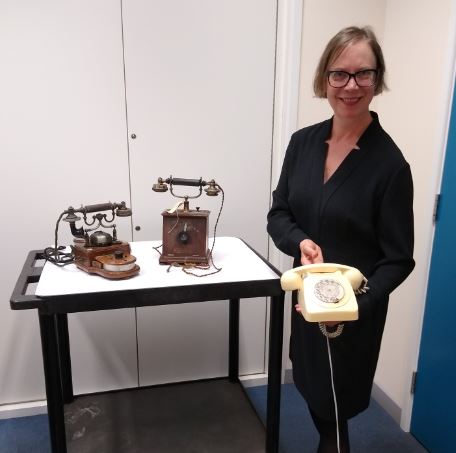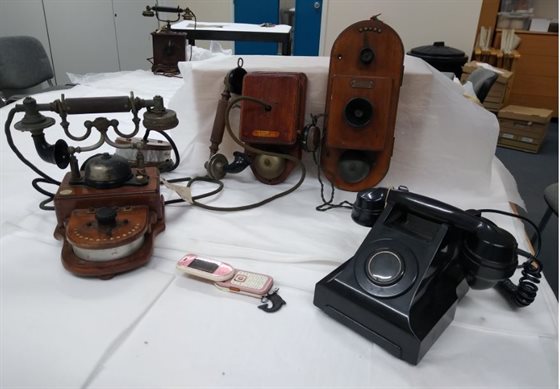Researchers called on vintage telephones for the second in a series of events which use nostalgia to help people get to grips with modern technology.
Leicester Museum and Art Gallery’s collection of rotary dial telephones and an early mobile flip phone were used to help a ‘digitally excluded’ group of citizens aged 60 and above from local charity Leicester Ageing Together in the research study initiated and led by Dr Josie Barnard of De Montfort University Leicester (DMU).

Dr. Barnard’s research analyses problems of ‘digital exclusion’ and provides solutions to digital skills acquisition using creativity and ‘humanisation’. It shows that using familiar objects such as old-fashioned rotary dial telephones reminds people that these, too, were once seen as new technology. Remembering that they were able to use new technology in the past boosts their confidence and creates a more positive attitude to new challenges.
“Using things which are familiar helps people to engage with new technology,” explained Associate Professor Josie Barnard, who is Subject Leader of Creative Writing. “Terms like ‘algorithm’ and ‘binary code’ can be daunting if someone’s new to or nervous about new technology. The basic principle is to use the old technology to teach about the new technology in a space which feels comfortable and which participants trust, which is why I wanted to work with the museum.
“My research explores how you can ‘future-proof’ digital upskilling, and what’s going to future-proof people is their ability to roll with the punches and use their own internal resources. This is why trust, confidence and creative flexibility are so important.”

Members of charities Leicester Ageing Together (LAT) and Reaching People took part in the ‘Digital Creativity Live at the Museum’ event remotely via Zoom.
Activities were planned for the 22 participants which encouraged them to play and explore, led by Dr. Barnard and Professor of Computing Christine Goutrié, in Germany, supported by research assistant Charlene Lee.
The participants are regulars of community, health and inclusion ‘Zoom’ projects run by Friday Chidlow and Bharti Mistry for Leicester Ageing Together. Friday and Bharti have been holding online meetings since the start of the Covid-19 pandemic, to help attendees develop confidence in using computers and online activities that were new to them like video calling, or using emojis and the mute/unmute button, or online shopping.
Thanks to the team at Leicester Museum, they were able to use collection items including a 1918 Leicester drapers’ ‘five phone’ intercom system and a 2006 Nokia 7373 2 megapix flip phone to develop knowledge of binary code. The vintage technology was used in combination with a creativity and computational concepts activity co-devised by Dr. Barnard and Professor Goutrié for the event, to help develop understanding of binary code.
Bharti Mistry commented, “My Zoomers are all South Asians whose first language is not English, some struggle to write in English and it does not come quickly – so this was a double test for them. It was great to see them asking questions about binary code, not only on screen but also typing them into the Zoom chat.”
“The activities provided computational knowledge, then gave participants the opportunity to apply it, and then to further embed that knowledge,” said Friday Chidlow. “The inclusion of fun aspects was really valuable in helping the accumulation of knowledge.”
“For museums, it’s hard to give citizens meaningful engagement with collection items online,” says Leicester Museums Collection manager, Heather Southorn. “This event enabled meaningful engagement with collection items via Zoom, and helped with the development of digital skills.”
Professor Christine Goutrié says, ‘We all hear the term “binary code”, but gaining understanding of what binary code is and how it works can be hard. Even most supposed “digital natives” don’t have any real understanding of binary code. It was really exciting during the session to see participants gaining new knowledge “live”, with some quite high level computational inquiry.”
It was the second digital inclusion event run by Dr. Barnard at Leicester Museum and Art Gallery and was funded by the UK Research and Innovation Fund (UKRI). The first took place in February and used Imperial typewriters, which were once made in Leicester, to engage the audience and enable digital upskilling.
DMU has worked with partners Reaching People, Leicester Ageing Together and Leicester Museums Service on the sessions, which are supported by the Leicester and Leicestershire Enterprise Partnership (LLEP) as part of efforts to tackle digital exclusion.
The LLEP launched its Digital Skills Partnership last year with the aim of developing the digitally skilled workforce needed by employers. The partnership has since brought together more than 60 local partners from the public, private, voluntary and academic sectors. Together they are working on various projects to address common issues including digital literacy, training and digital poverty.
Posted on Thursday 21 July 2022